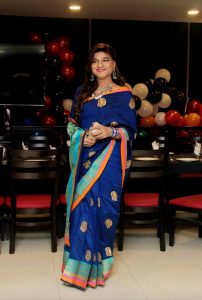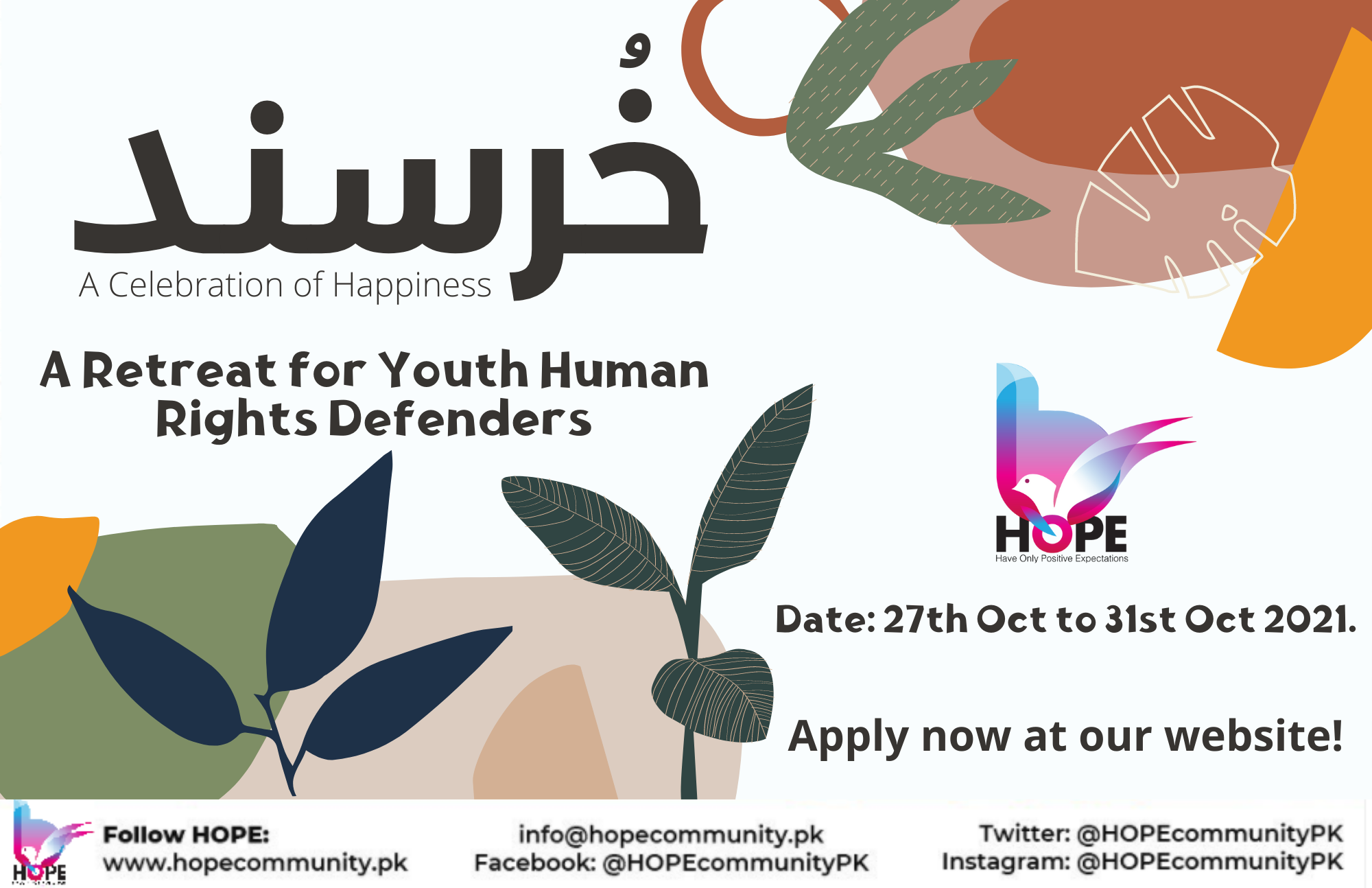“Caring for myself is not self-indulgence, it is self-preservation, and that is an act of political warfare.”
— Audre Lorde, A Burst of Light (1988).
Human Rights Defenders (HRDs) face multifaceted challenges in their work. They are in constant combat with power structures. The sexual, physical and verbal violence that HRDs face in this struggle takes a great toll on their health on a daily basis. Additionally, working with victims of violence is a main source of secondary trauma for activists who find little support on mental health. While activists are often told that the very nature of their work is what makes them ‘good’, ‘selfless’ people, it is often forgotten that it can have a very real impact on their wellbeing. The HRDs working on SOGIESC issues in Pakistan occupy a particularly vulnerable space in the society whose voices are muzzled or shamed into silence.
What do we want to do?
HOPE believes the answer lies in ‘sustainable activism’. Sustaining activism (and activists) or working ‘sustainably’ is a conscious set of choices — a reorientation of work that is grounded in political principles. These are some of the areas that are important for sustainability:
- Mental Health and Wellbeing: A key area of work under ‘sustainable activism’ is ensuring mental health and wellbeing of HRDs. The common thread in this work is catering to the holistic wellbeing of our communities. HOPE believes that grounding care work of empathizing, comforting, unlearning, supporting, and healing is central to a sustainable activist praxis. We believe that activists should be empowered and provided the necessary tools needed to understand and make choices necessary for their wellbeing.
- Holistic Security: Ensuring safety is perhaps one of the central tenets of sustainable activism. Because of the nature of threats and discrimination faced by activists, the very dialogue around holistic security is inevitably one that is deeply powerful and emotional. The very concept of safety for HRDs centre around open dialogue, exchange of ideas, and personal and collective growth in order to improve collective wellbeing of activists. By approaching the concept of security holistically, the conversation can account for the very real way that emotional health and wellbeing can impact how activists view their work and the kind of security they need.
What is ‘sustainability’, then? What is all the buzz on working ‘sustainably’ about? Jane Barry and Jelena Dordevic in the seminal work What’s the Point of Revolution if We Can’t Dance? define sustainability as
“being able to do the work you love, and still feeling full and happy in every part of your life. Feeling safe. Feeling connected. Feeling recognised, respected and valued – for who you are and what you do. At any age. Working on any issue. Authentically. True to your own values. Finding a way to put the soul back into your life and work.”
What has HOPE done so far?
HOPE has a yearly ritual of holding a wellbeing retreat for HRDs. We have infused these spaces with workshops and training on risk assessment, threat management, security planning and digital security to equip the activists with tools necessary for systematically working through the challenges they face in their work. These retreats have become central to holding essential conversations on health and wellbeing as well as strategizing around building sustainable movements.
In 2019, we co-organized an activist convention and retreat on security, health and wellbeing of HRDs, titled Qandeel. The week-long event honoring Qandeel Baloch, a queer icon for many, courted 40 HRDs from all over Pakistan and featured local and international experts on security and well being. In 2020, we co-organized Umang, a union of hope and diversity, which brought together 30 HRDs for trainings on risk management, monitoring human rights abuses and building sustainable movements that center wellbeing.
What do we plan to do this year?
 This year HOPE is organizing a retreat for youth human rights defenders working on SOGIESC issues in Pakistan. This retreat is a tribute to the late Khursand Bayar Ali, a beloved activist for transgender rights and a brave defender of human rights and rule of law, who left us too soon. Khursand was a mother, a sister, a teacher and a friend who touched many lives and taught us the meaning of care. To honor her memory, we seek to celebrate her innumerable contributions to the community and remember her in power and joy.
This year HOPE is organizing a retreat for youth human rights defenders working on SOGIESC issues in Pakistan. This retreat is a tribute to the late Khursand Bayar Ali, a beloved activist for transgender rights and a brave defender of human rights and rule of law, who left us too soon. Khursand was a mother, a sister, a teacher and a friend who touched many lives and taught us the meaning of care. To honor her memory, we seek to celebrate her innumerable contributions to the community and remember her in power and joy.
Staying true to the meaning of Khursand’s name and what she came to represent, this year the activist retreat is all about our happiness. It is a celebration of Khursand — of happiness. This retreat will be a three-day event that aims to facilitate a unique space for youth leaders of grassroots and community-led organizations in Pakistan to reflect, experiment, share, and learn together about how best to support greater wellbeing, resilience and joy within their work. The retreat will serve as an environment for reflection, innovation, and honest exchanges on what makes us happy in our life and work and how we can honor and cherish that. This is a space in which youth HRDs can have the flexibility to learn, make mistakes, iterate, and deepen their inner wellbeing and organizational practices in dialogue with each other. By bringing together youth HRDs from various cities, we hope to build strong bonds between them and find ways to work in collaboration.
Who can apply?
Although wellbeing is a concern for everyone, regardless of age, gender, ethnicity or sexuality, this year our thematic focus in on the youth in our communities. The passion and vigour brought by the young in our ranks is precious and deserves to be celebrated. We are courting young people from all over Pakistan working on SOGIESC issues to bring their freshness of thoughts and innovative ideas to the table and work together to formulate strategies for overcoming the challenges facing us today in order to build a brighter future together. You can apply for the retreat if you are:
- based in Pakistan;
- between the ages of 18-33;
- a person marginalized on the basis of SOGIESC;
- working on SOGIESC issues with your local communities (in the form of networks, collectives or organizations); and
- interested in learning about sustainability, wellbeing and movement-building in marginalized contexts.
The selected participants are expected to:
- Travel to the retreat location (disclosed only to selected participants) and reside on a shared accommodation basis with other participants at the site.
- Participant in all sessions and activities during all three days of the retreat.
- Provide feedback and share their learnings from sessions and activities in the retreat.
- Cooperate with the site management and organizing team in all regards and abide by all logistical directions given by the admin team.
- Abide by all rules and guidelines on security of the participants. Obey guidelines for photography and social media use during the retreat.
- Abide by all rules, policies and guidelines for the shared residential spaces of the retreat.
- Pilot programs, projects, events and conversations on wellbeing and sustainable movement building in their local communities.
- Support HOPE and their respective organizations in promoting conversations on wellbeing and movement building among activists.
Note: HOPE reserves the right to take appropriate action against any participant for breaching security or ethical protocols for the retreat.
To apply for the Khursand Retreat for Youth Human Rights Defenders, fill out the form here.
Limited seats are available. If you have been selected for the retreat, we will reach out to you on the email address that you have provided. For queries and concerns regarding registration and logistics reach out at ts.communications@hopecommunity.pk.
For general queries, email us at info@hopecommunity.pk.


